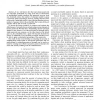Free Online Productivity Tools
i2Speak
i2Symbol
i2OCR
iTex2Img
iWeb2Print
iWeb2Shot
i2Type
iPdf2Split
iPdf2Merge
i2Bopomofo
i2Arabic
i2Style
i2Image
i2PDF
iLatex2Rtf
Sci2ools
144
Voted
INFOCOM
2010
IEEE
2010
IEEE
Password Strength: An Empirical Analysis
—It is a well known fact that user-chosen passwords are somewhat predictable: by using tools such as dictionaries or probabilistic models, attackers and password recovery tools can drastically reduce the number of attempts needed to guess a password. Quite surprisingly, however, existing literature does not provide a satisfying answer to the following question: given a number of guesses, what is the probability that a state-of-the-art attacker will be able to break a password? To answer the former question, we compare and evaluate the effectiveness of currently known attacks using various datasets of known passwords. We find that a “diminishing returns” principle applies: in the absence of an enforced password strength policy, weak passwords are common; on the other hand, as the attack goes on, the probability that a guess will succeed decreases by orders of magnitude. Even extremely powerful attackers won’t be able to guess a substantial percentage of the passwords. The resul...
Related Content
| Added | 28 Jan 2011 |
| Updated | 28 Jan 2011 |
| Type | Journal |
| Year | 2010 |
| Where | INFOCOM |
| Authors | Matteo Dell'Amico, Pietro Michiardi, Yves Roudier |
Comments (0)

